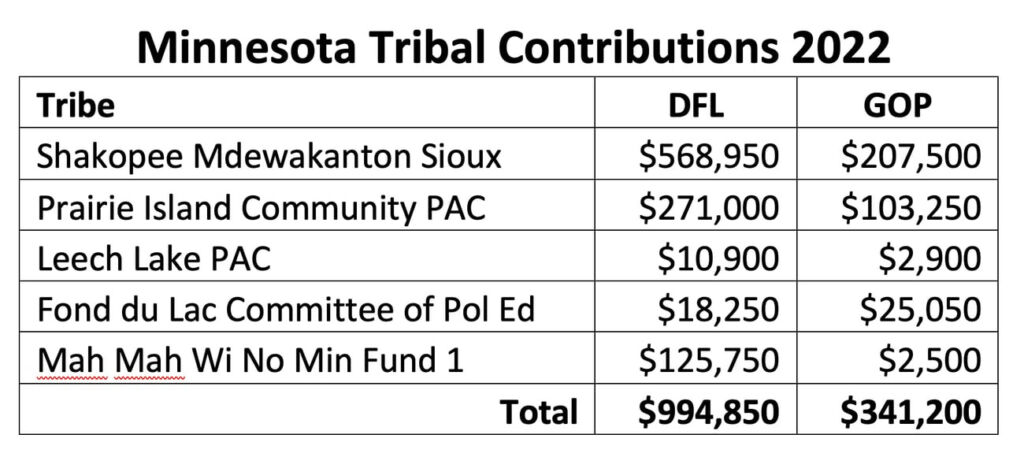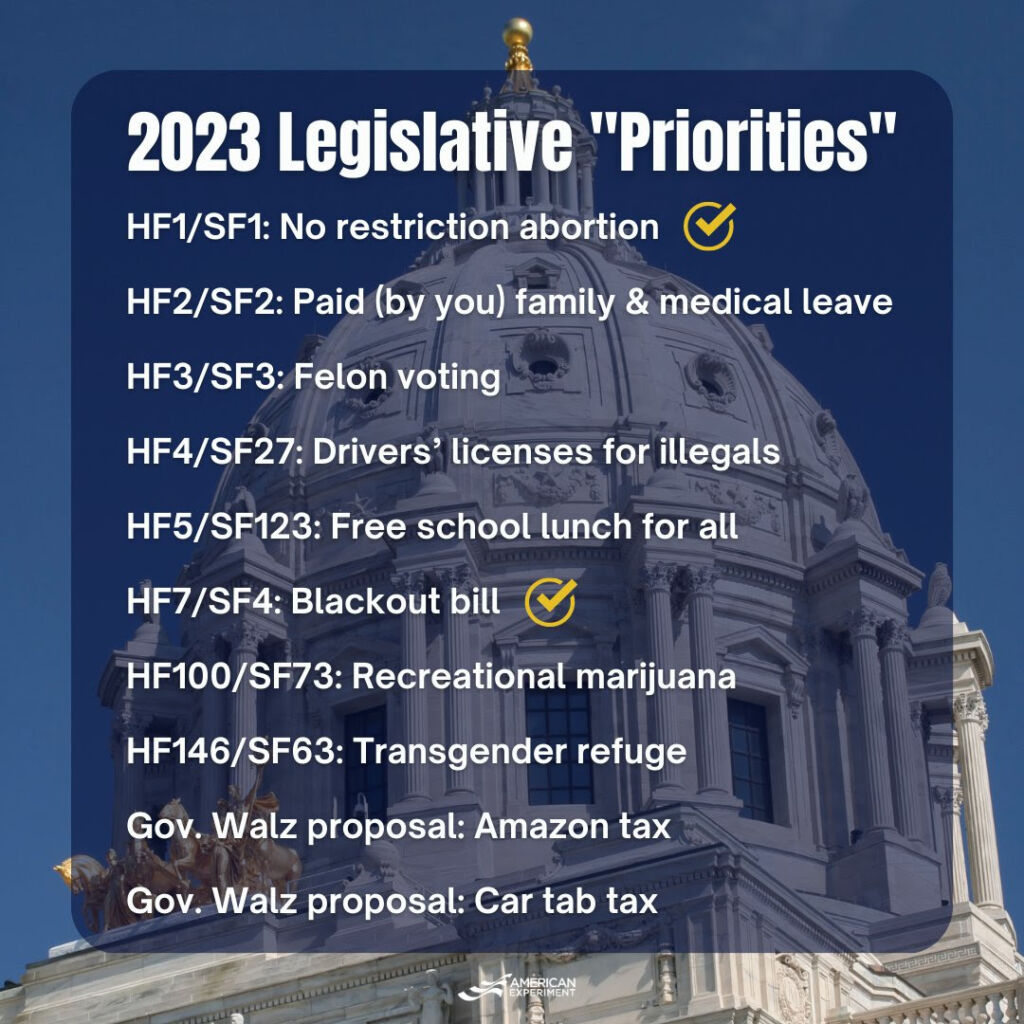DFL pay to play
Pay to Play
In one of the most blatant (and profitable) pay-to-play arrangements in state history, Democrats in Minnesota are about to provide a huge return on investment to Minnesota’s American Indian tribes for their $1 million investment in the 2022 election. The announcement this week that a sports betting proposal will give exclusivity to Minnesota tribes is the next shoe to drop in the onslaught of bad legislation coming from Democratic majorities in the House and Senate.

Minnesota already has the worst Indian gaming compact in the United States, with the tribes getting all of the proceeds from casino gambling in a deal with no expiration date. Sports betting was an opportunity to spread the wealth of gambling revenue to the two horse racing enterprises and possibly bars, restaurants, and other organizations in Minnesota. There were proposals last year in the Republican-led Senate that did just that. But money talks, and the $1 million given by American Indian tribes to DFL candidates will pay off for years to come with this new deal.
The legislation calls for sports betting exclusivity for Minnesota tribes allowing them to add sports books at their casinos similar to what you’d find in Las Vegas. Each of the eleven tribes would also be allowed to cut their own deal for online sports gambling with a mobile gaming platform such as DraftKings or FanDuel. All online sports betting will go through one of these tribal deals. Unlike the current sweetheart deal, the State of Minnesota will receive 10% of the net revenue on sports betting, but bill sponsors believe it will only bring in $12 million per year.
Not wanting to bite the hand that feeds them (and builds them stadiums), Minnesota’s professional sports teams have all signed off on the backroom deal. Get ready for a blitz of marketing from the Twins and Vikings promoting sports gambling with the tribes. “Come to the game! Bet on the outcome!”
Noted Libertarian Gov. Tim Walz is likely to sign the bill, telling the Star Tribune “adults should be able to make their own decisions.” Quite a statement from the guy who shut the state down, made everyone stay home and wear masks in public for two years. In addition to the $1 million spent on DFL candidates, Walz also received $25,000 from the Shakopee Mdewakanton Sioux Community for his inauguration party this year.
Minnesota compacts
In the 1980s, the federal government allowed Indian tribes to enter monopoly gambling arrangements with the states called “compacts.” Minnesota’s gaming compacts were not even approved by the legislature at the time. Most were negotiated and signed by DFL Governor Rudy Perpich, with the final two compacts signed by Independent Republican Governor Arne Carlson.
There are two major problems with Minnesota’s gaming compacts. First, there is no expiration date — they last forever giving Minnesota tribes no incentive to renegotiate. Second, unlike every other state, they provide no revenue to the state from Indian gaming.
Instead of using the emergence of sports betting to add some balance to the gaming issue in Minnesota, the DFL approach add to the tribes’ monopoly control over gambling revenue.
Follow the money
So why would DFL lawmakers give Indian tribes such a good deal on this new revenue source? Follow the money. For most of their existence, tribal interests in Minnesota have given overwhelmingly to Democratic politicians. Only recently have they begun to hedge their bets with Republicans, mostly Majority Republicans in the Senate. But the 2022 campaign finance data shows the tribes gave Democrats three times as much money as Republicans.

There are many things to consider around the expansion of gambling, especially the social costs related to the inevitable increase in gambling addiction. But if Minnesota chooses to go down this road, there is no reason to add to the monopoly control enjoyed in perpetuity by our Indian tribes.
Media Watch: Star Tribune ignores campaign contributions
The Star Tribune wrote a detailed story about the announcement of the tribe-only sports betting monopoly but were too lazy to mention any of the campaign contributions from the tribes to DFL candidates. They must have missed that day in journalism school when the concept of “follow the money” was taught. Or perhaps, like the sports teams, Star Tribune Inc. is planning to cash in on some of the new marketing dollars available through sports betting. Even the progressive online news source TheMinnesota Reformer noted the imbalance in campaign contributions from the tribes to DFL candidates.
Election law follow-up: criminalizing speech
We missed a provision in our list of election law changes proposed by Democrats this session. There is a provision tucked into the elections bill that would make it a gross misdemeanor punishable by a $1000 fine for each violation “transmitting false information” about an election within 60 days of voting. Here is the text from the bill (HF 3):
Subd. 2. Deceptive practices. (a) No person may, within 60 days of an election, cause
information to be transmitted by any means that the person:
(1) intends to impede or prevent another person from exercising the right to vote; and
(2) knows to be materially false.
(b) The prohibition in this subdivision includes but is not limited to information regarding
the time, place, or manner of holding an election; the qualifications for or restrictions on
voter eligibility at an election; and threats to physical safety associated with casting a ballot.
The chilling language that says “includes but is not limited to” should make people nervous. Secretary of State Steve Simon and Attorney General Keith Ellison will use this section of law to go after the disinformation they see as such a threat to democracy. No more jokes about Democrats voting on Wednesday and Republicans on Tuesday.

Click here to get caught up on all Capitol Watch newsletters from this legislative session!
Subscribe to Capitol Watch
Minnesota political news from an insider’s perspective.